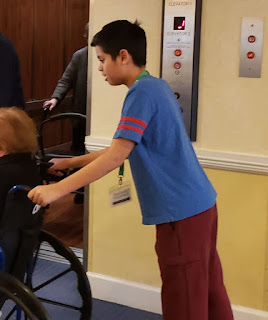Learning Civics
Civics is formally the study of the rights and duties of citizenship. And citizenship is about being a responsible member of a community or society. In the seventies when I was in high school, we were required to complete several hours of service for every school year as part of the government's Youth Civic Action Program (YCAP). Obviously, whether a student learn what civics entails depends on what the student does to fulfill such a requirement. I probably did not learn that much since most often, it felt simply like forced labor with no obvious opportunity to experience what it really meant to be a citizen. One year, I was scrubbing concrete steps of stairs with hydrochloric acid in a newly constructed building for our high school. I was not taught how to handle carefully the acid and I was made to work without gloves or a mask. At the moment, there is a bill in the Philippines Senate that aims to establish a citizenship program, giving college and senior high school students the choice between military training or a civil service requirement. The civil service requirement can be fulfilled by community service, disaster preparation, and environmental protection. Of course, the benefits of such a program, similar to the one I went through, depend on the details of implementation. My son, who is in eight grade here in the United States, has a similar requirement. Unlike my experience in the Philippines, my son has something much more meaningful.
In my son's case, four hours are required every quarter. My son, however, has to write a reflection on what he has done each quarter. Specifically, a student has to answer the following questions:
What impact did your service have on your community?
How did your service help you identify your own strengths and areas for growth?
For this requirement to be doable, there should be ample opportunities in the community. Fairfax county as well as various church and civic organizations provide such opportunities. In the first quarter, my son helped in the Festival of our Parish. He was in charge of a refreshment booth and was supervising young children in an escape room. In the second quarter, he was part of a "Breakfast with Santa" event. Each quarter does require my son to find an opportunity to serve. And this is clearly part of his learning. In the current quarter, there are three possible activities: Helping in the food pantry for the parish, cleanup of Lake Accotink Park, and spending time with the elderly in an assisted living community. My son chose to work with the elderly. And I am quite sure he felt something much more meaningful than I did while pouring acid on the steps of the stairs.
In my son's case, four hours are required every quarter. My son, however, has to write a reflection on what he has done each quarter. Specifically, a student has to answer the following questions:
What impact did your service have on your community?
How did your service help you identify your own strengths and areas for growth?
For this requirement to be doable, there should be ample opportunities in the community. Fairfax county as well as various church and civic organizations provide such opportunities. In the first quarter, my son helped in the Festival of our Parish. He was in charge of a refreshment booth and was supervising young children in an escape room. In the second quarter, he was part of a "Breakfast with Santa" event. Each quarter does require my son to find an opportunity to serve. And this is clearly part of his learning. In the current quarter, there are three possible activities: Helping in the food pantry for the parish, cleanup of Lake Accotink Park, and spending time with the elderly in an assisted living community. My son chose to work with the elderly. And I am quite sure he felt something much more meaningful than I did while pouring acid on the steps of the stairs.

Comments
Post a Comment